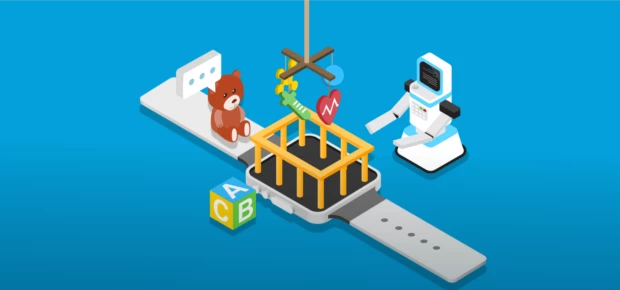
Partner Article
Generation AI 2018: second annual study of millennial parents of Generation Alpha kids
Children born from 2010-2025 are part of what’s called Generation Alpha, considered by many to be the most tech-infused demographic to date. Though we often hear about their use of tablets and phones, a potentially more significant question is how artificial intelligence (AI) technologies will impact their lives. To find out what their millennial parents are expecting, IEEE conducted its second annual Generation AI survey, this year focused on health-related AI.
The study surveyed 2,000 parents, ages 20-36, with at least one child eight years old or younger – 400 each in the United States, United Kingdom, India, China and Brazil. Some of the key findings are as follows
Generation Alpha trend watch: babies wearing AI health trackers
Using AI, wearable technology will soon track many different forms of health data.
Millennial parents across the globe are most comfortable letting their Generation Alpha children use health wearables starting in their teenage years. However, more than half would have those as young as infants and up to five years of age wear them.
Kids not feeling well? AI knows why … and how to fix it
AI will continue to develop rapidly over the next decade. A clear majority of Millennial parents in each country we studied say they would have at least some trust in AI for diagnosing and treating their children. More than half even say they would have a “great deal of” trust.
*Speak up and smile: the chatbot + biometric pediatrician is in
Chatbots can increasingly analyse a sick person based on data about their symptoms, history and circumstances. More than eight out of 10 parents in India and China say they are likely to use this technology to diagnose their sick child in the future. However, roughly half the parents surveyed in the U.S. and U.K. say they would not be likely to use a chatbot for this purpose.
Through photos, facial recognition software can also help diagnose rare diseases. Feelings are similar here as they are for chatbots: More than eight in ten Millennial parents from Asia say they would be very comfortable using this technology, while half of those in the U.S. and U.K. would not.
Robot surgeons get a thumbs up to operate on millenials’ children
Surgical robots powered by AI are bringing new innovations and accuracy to the operating room. 82 percent of Millennial parents in China and 78 percent in India are very likely to allow robots powered by AI to conduct surgery on their Generation Alpha child. In the U.S. and U.K., only 45 percent of Millennial parents feel similarly.
In life or death decisions for Generation Alpha kids or their own parents:
Millennials trust doctors relying on AI
When asked whether they would trust doctors basing their recommendations on data from AI to make life-or-death decisions regarding their children, 51 percent of Millennial parents in India say they strongly agree. That number is closer to one-third in China, the U.S. and Brazil.
When it comes to making the same decisions regarding their own parents, Millennial parents express less trust in doctors using AI data than they did for their children.
AI, not kids, preferred by millennial parents for care during golden years
Millennial parents say they would prefer to use AI to live independently during their golden years, rather than relying on their children. This is especially true in China (94 percent). Fifty-six percent of U.S. parents said they would prefer to rely on AI, a seven percent decrease from 2017.
Real-time AI health monitoring and data tracking will become routine in the future
Majorities of Millennial parents across the globe are confident AI will make real-time, round-the-clock monitoring and data tracking of their health – including AI-powered reminders for medicine, exercise and doctor’s visits – a routine practice, especially in Asia.
Millennials see cancer eradicated in Generation Alpha’s lifetime, thanks to AI
Medical imaging coupled with AI can now diagnose many forms of cancer even before anything is suspected. According to the survey, Millennial parents in Asia are significantly more likely to think AI medical breakthroughs will help eradicate cancer during Generation Alpha’s lifetime than parents in the U.S. and U.K., who are split on this future outcome.
This was posted in Bdaily's Members' News section by IEEE .








 Putting in the groundwork to boost skills
Putting in the groundwork to boost skills
 £100,000 milestone drives forward STEM work
£100,000 milestone drives forward STEM work
 Restoring confidence for the economic road ahead
Restoring confidence for the economic road ahead
 Ready to scale? Buy-and-build offers opportunity
Ready to scale? Buy-and-build offers opportunity
 When will our regional economy grow?
When will our regional economy grow?
 Creating a thriving North East construction sector
Creating a thriving North East construction sector
 Why investors are still backing the North East
Why investors are still backing the North East
 Time to stop risking Britain’s family businesses
Time to stop risking Britain’s family businesses
 A year of growth, collaboration and impact
A year of growth, collaboration and impact
 2000 reasons for North East business positivity
2000 reasons for North East business positivity
 How to make your growth strategy deliver in 2026
How to make your growth strategy deliver in 2026
 Powering a new wave of regional screen indies
Powering a new wave of regional screen indies